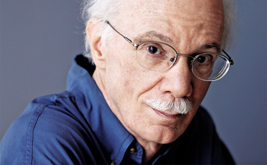
Cuba Rethinks the Revolution Cuba Rethinks the Revolution
Under Raúl Castro, major economic reforms are shrinking the state-run economy and making room for a greatly expanded private sector.
Oct 19, 2011 / Feature / Michelle Chase
GOP’s Adventures in Foreign Policy Land GOP’s Adventures in Foreign Policy Land
Less than impressive were the GOP hopefuls on the world outside our borders. But, at least, less hawkish than might have been.
Oct 19, 2011 / Bob Dreyfuss

Eve Ensler: Wall Street and Women’s Work Eve Ensler: Wall Street and Women’s Work
How can women make their voices central to the debate that the Occupy movement has created?
Oct 19, 2011 / Francis Reynolds and Emily Douglas
Local Governments Slash Funding for Domestic Violence Survivors Local Governments Slash Funding for Domestic Violence Survivors
Topeka, Kansas, decriminalized domestic violence to save money. It’s not the only city to cut services to survivors of abuse, just as the need escalates.
Oct 19, 2011 / Bryce Covert

Vacant, Limpid, Angelic: On Willem de Kooning Vacant, Limpid, Angelic: On Willem de Kooning
MoMA’s de Kooning retrospective.
Oct 18, 2011 / Books & the Arts / Barry Schwabsky

In the Clear: On Scientology In the Clear: On Scientology
The body of the church of Scientology is not well. Will its main legacy be its contribution to US tax law?
Oct 18, 2011 / Books & the Arts / Mark Oppenheimer

The Edge of Comprehension: On Steven Millhauser The Edge of Comprehension: On Steven Millhauser
With We Others, Steven Millhauser remains the master of the inevitable ending in American fiction.
Oct 18, 2011 / Books & the Arts / Aaron Thier
Puzzle No. 3212 Puzzle No. 3212
ACROSS 1 and 11 For example, Roth’s bedtime story? (10,7) 6 Hare evolved into bird (4) 10 Regressive laws about heart of this island’s first language (7) 11 See 1 12 Avoids low strings around the front of your piano (8) 13 NASDAQ organized information sessions (1,3,2) 15 and 20 Honey weaves an old-timey song (3,2,4,2,7) 16 In swanky car facing north, choreographer José… (5) 18 …socks a prophet (5) 20 See 15 23 Our gang encounters malevolent insect (6) 25 Coins are scattered in plot (8) 27 Dole rudely taking sailor’s dancing gear (7) 28 Initially different, roundabout routes! (7) 29 Legendary river lingers in the ear (4) 30 Hell yeah—woman flees clever cat from Japan (5,5) DOWN 1 Rhododendron mounted on a reddish-brown horse (7) 2 Monks who play drum sets? (9) 3 Once again supply Brazilian funds to author Grafton (7) 4 Assistant in Minnesota with tuna salad for unwed relation (6,4) 5 Interacts evenly and without irregularity (4) 7 Frankfurter’s also coming after most of hot dog (5) 8 Sinatra: far-out craftsman (7) 9 Poor writing to progress slowly after beginning of saga (6) 14 Chili-bread mix that’s toxic to vegetables (10) 17 Diamonds, e.g., cited in child-custody filing? (5,4) 18 Mercury sources for writer (1,1,5) 19 Gingersnap I calmly held on the tip of the tongue (6) 21 Sister at Alaska’s glacial mountain (7) 22 Visits backwards locations at both ends of Berkeley (5,2) 24 Cover of elegant, thin magazine (5) 26 Prune front of bush at property line, to get outside limit (4) ACROSS 1 TIDE + MARK (edit rev.) 5 CUR(V)ES 9 T (true) + Maria cut anag. 11 HOUR + I 12 & 16 2 defs. 13 AMA + RETTO (otter rev.) 15, 23, 19 anag. 18 RESPEC + TABLE (creeps anag.) 20 ref. 25 across 22 anag. 25 C (100) + IV (4) + IL (49) 26 anag. 27 “sir tacks” 28 P(RESENC)E (screen anag.) DOWN 1 anag. 2 DRAW + DOWN + S 3 anag. 4 rev. 6 U + SHERETTE (the trees anag.) 7 2 defs. 8 2 defs. 10 COM + IN + GB + Y 14 REP + TILES 16 “gorilla” 17 EL(EV[en])ATION 21 M + OVER 24 B(U)RR
Oct 18, 2011 / Joshua Kosman and Henri Picciotto
The Silence of the Elites The Silence of the Elites
Even as Occupy Wall Street heats up, Washington plans to spend the winter arguing about how to further mutilate the economy.
Oct 18, 2011 / Katrina vanden Heuvel
